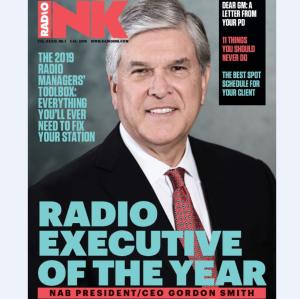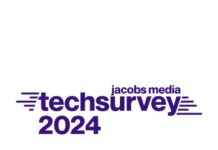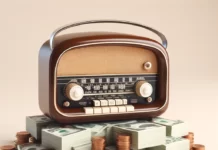
NAB President and CEO Gordon Smith is on the cover of the current issue of Radio Ink Magazine. Smith was named Radio Executive of The Year by the Radio Ink Editorial Board. In our interview we asked Smith about the controversial subject of deregulation. And, he did not shy away from the topic. Here’s an excerpt from that interview.
Radio Ink: Where do you think the radio industry is headed on deregulation?
Smith: With the divided Congress, they will be more focused by the Democratic House majority on the deregulatory agenda of the FCC, but knowing Chairman Pai as I do, he will continue to pursue deregulation that makes sense and is in the best interest of radio broadcasters. There will be a heightened temperature, I suspect, between the administration and House of Representatives, but I suspect that it will continue apace in terms of deregulation. They are going to also have the 2018 Quadrennial Review that the FCC will take up, and that involves radio.
Radio Ink: Do you think this is radio’s best chance to achieve deregulation, with Chairman Pai and the way the FCC is currently made up?
Smith: I do; I don’t think there is any question about that. For example, we run a democracy here at NAB, and we have such a breadth of diversity of radio members between large markets and small mom-and-pop stations. It is that diversity we try to corral and get the best intelligence from, to come up with positions that ultimately are defensible and in the best interest of the most of our members. We have asked the FCC, for example, in the top 75 Nielsen markets to consider allowing a single entity to control up to eight commercial FM stations, with no limit on AM stations. In markets 75 and above, our board has supported that there be no restrictions on the number of AM or FM stations any single entity could own or control.
That is not without controversy. There is not unanimity on that issue, but it is a vast majority of NAB members who came to that position. We expect that the FCC will give serious consideration to this proposal. They are the ones who have put it on the agenda, so whether NAB takes a position or not, the FCC is likely to do something. This isn’t necessarily a fight we have pushed, but it is something that will help radio to have a little more elbow room as it makes its way into the future.
To subscribe to Radio Ink in time to receive the issue with Gordon Smith on the cover GO HERE
Radio Ink: What do you say to the folks who believe this is more of the large markets wanting more deregulation while the small markets think deregulation ruined radio?
Smith: This is a view we have heard loud and clear. It is a minority view at NAB, but not one we have been disrespectful of. We have tried to lead people to as much of a consensus as we can. It is not an illegitimate perspective that they are voicing, it is just not the majority. I am charged with leading a democracy here. We are respecting all these different views and have come up with something meaningful and respectful of all the diversity we have.
Radio Ink: How hard is it to get some kind of agreement on an issue as big as consolidation?
Smith: One of the things that helped us come up with consensus is that we had a committee that worked very hard on this issue. It was composed of the largest and smallest markets and everything in between. They came up with this recommendation. While it is not unanimous in terms of our membership, it does represent a very large majority.
Radio Ink: Will it hurt the chances of more deregulation, being that the industry is not united?
Smith: This is an issue that was being discussed by the NAB prior to Chairman Pai taking his seat, but this is an issue being pushed by the chairman of the FCC. Our choice was to say or do nothing in response to his agenda or to be constructively engaged with his agenda and shepherd everyone to as large a consensus as possible. My guess is Chairman Pai and the FCC are going to do what they are going to do whether we do anything or not, but I have always believed it is better to engage and try and shape the future rather than have it imposed on you by someone else.
Radio Ink: Are you of the belief that Facebook and Google going into local markets and taking ad dollars is a strong argument for deregulation?
Smith: It has been one of the arguments we have heard most vociferously from proponents of deregulation among the members.
Editor’s Note: On December 12, 2018, the FCC adopted a Notice of Proposed Rulemaking that set in motion the discussion regarding the commission’s 2018 Quadrennial Review of the commission’s media ownership rules.
To subscribe to Radio Ink in time to receive the issue with Gordon Smith on the cover GO HERE









In this interview Gordon Smith (who I have a great deal of respect) says” we have a democracy here at the NAB”. The definition of democracy is “a system of government by the whole population”. The whole population would include radios owners, managers and all its employees. The NAB’s radio board last time I checked only included owners and group heads, not a democracy of the whole population. The NAB’s responsibility is to serve the Oligarch’s of radio and that is it’s board members.
The last time the FCC imposed its ruling on the radio industry, only those at the top saw a financial windfall. Those who were owners, bankers and group heads (Oligarch’s) made billions.
Recently I-heart and Cumulus emerged from bankruptcy shedding a combination of $12,000,000,000 (that’s $12 billion) in debt. My guess is the CEO’s and CFO’s of those companies will receive millions in bonuses in 2018 and 2019. They were able to write all that money off because they proved that their reorganization plan would make them healthy again. Who is impacted by those reorganization plans? Certainly not the whole population, not the suppliers.
Radio is a very successful business, always has been. In large and medium markets the average EBITA was in the 30% range. How many businesses would die to have 30% cash flow margins?
The whole issue of being challenged financially was the narrative used by the Oligarch’s of radio in 1993 and again in 1996 which resulted in Duopoly and the Telecommunication act.
So here we are again, the NAB lobbying for those same Oligarch’s to change the rules yet again.
I get it Gordon, but please don’t pretend the NAB is a democracy. Further deregulation will benefit the few and as the last two times have proven and not the “whole population”.
I fear we did not learn from our history, therefore we are bound to repeat it. Further deregulation is not going to serve the radios 97% population, rather more millions will flow into pockets of owners, brokers and the few 3% at the top.
Common sense keeps caps on ownership. Marrying one or two “wives” in a market should give ample pleasure and productive returns. How is the public best served by greedy “polygamists” lusting to hop on every channel in sight? If a market can’t support a band full of signals, leave some “virgins” for handsome young guys who have none, who couldn’t afford buying a previously used “mama.” The NAB and the Commission should note that the general public is never well served by “Harems.”
I’m a small market owner and I can say wholeheartedly, that one size does not fit all. In other words, deregulating large markets is different than deregulating small markets. The market I’m in, is 7500 population with 3 full-service radio stations…2-FM’s and 1-AM. Two of the three almost went dark because there isn’t enough revenue to support more than one owner. The advertising revenue in small markets is small. One owner, who is a true broadcaster and super serves his/her small market might me able to survive. More than one owner in a small market makes it very difficult to make a living. Again, big markets are not the same as small markets and should not me looked at the same. An iHeart or Cumulus isn’t interested in owning a small market…there isn’t enough revenue.
BTW even if the Republican FCC gets deregulation in their rules, it won’t change the DOJ rules for monopolies. So companies would still have to meet competition criteria from the DOJ to buy additional stations. That’s where ownership rules would remain in place. Unless Congress changes the monopoly laws. So the idea that one company could own all of the radio stations in the country or even in a market is unlikely. Especially since a certain percentage of those radio stations are non-commercial.
1. Allowing one group to buy up all the stations in a market will lead –not to buy-outs of the remaining owners–but instead to “block busting” to drive out the remaining owners at fire sale prices;
2. But….2 + 2 does not equal 4–owning all stations in a market does not guarantee harvesting all the advertising dollars. Even close: Exhibit 1–IHeart/Exhibit 2–Cumulus
3. Ownership Diversity is best served by having more stations available for sale–not fewer. Not by locking up all the available properties in a market
At no time does Mr. Smith demonstrate how even greater ownership by those with the capital to participate would be of any benefit to audiences or advertisers.
Rather, he is about protecting and expanding ownership.
Does it not occur to the larger corporations that they have yet to figure out how to run robust and prosperous sticks in their markets without overwhelming the smaller outfits?
Of course not, particularly when it’s easier just to buy them out.
These guys aren’t true broadcasters. They are instead businessmen that own radio stations.